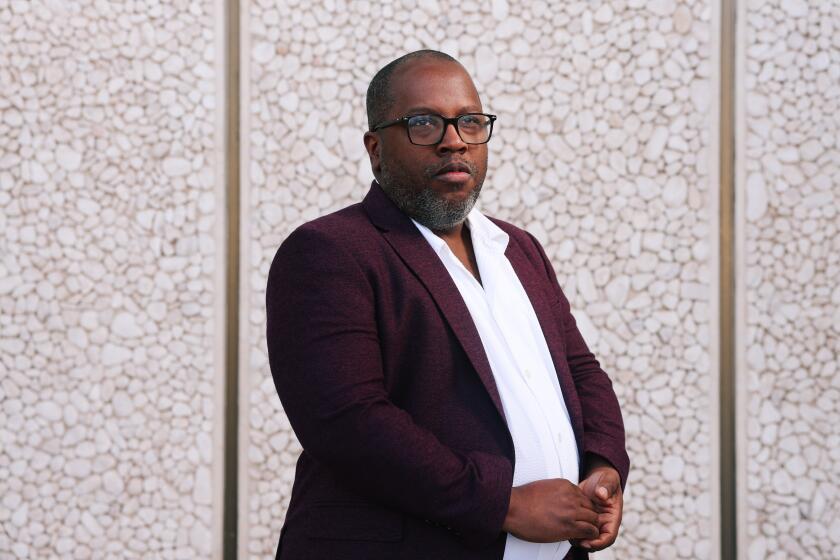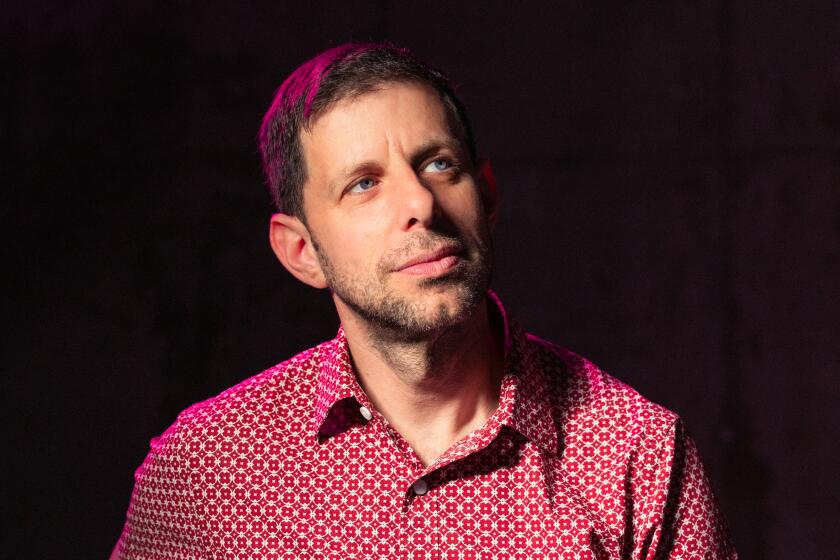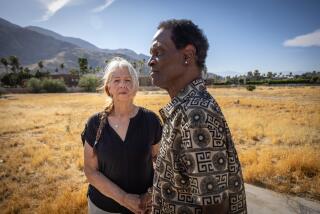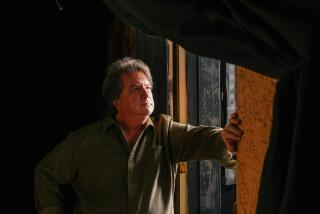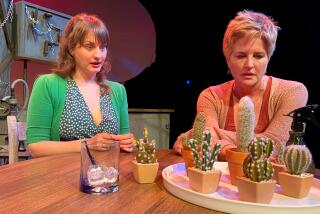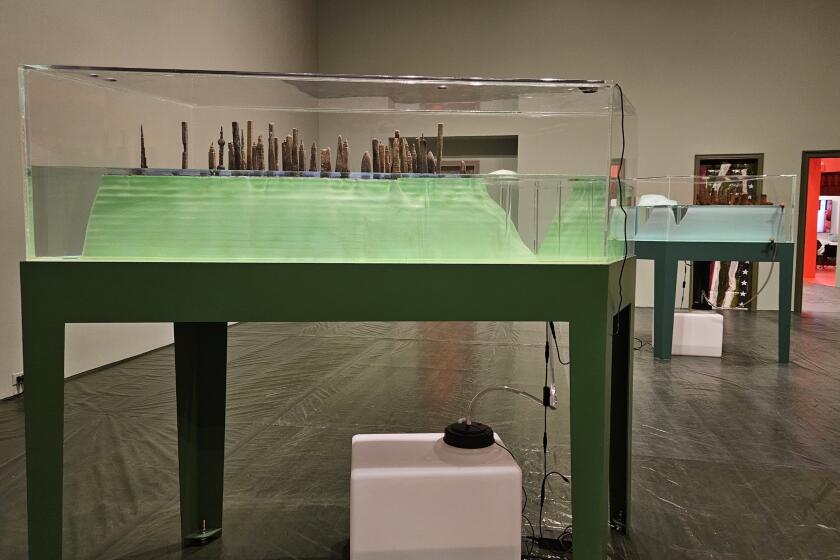‘Slave Play’ shocked and provoked. How the ‘Slave Play’ documentary on Max aims for the same
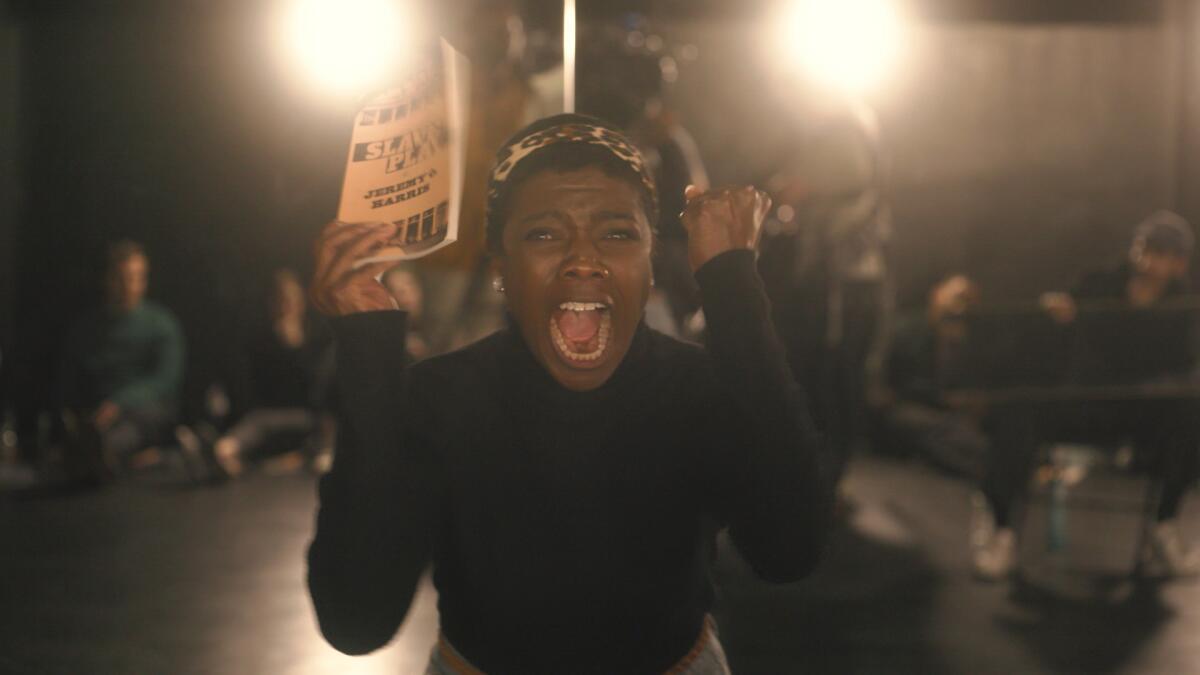
Even before “Slave Play” burst onto Broadway in 2019, producers and studios were already urging Jeremy O. Harris to adapt his play into a film or a TV show.
“My first thought,” the 35-year-old playwright says, “was absolutely not.”
“Slave Play,” which Harris wrote during his first year as a graduate student at Yale University, revolves around three modern-day interracial couples participating in “antebellum sexual performance therapy” at a former plantation in Virginia, where discomforting themes of racial trauma, slavery, sexual identity and power are explored. From its earliest incarnations at Yale, then off-Broadway at the New York Theatre Workshop and finally on Broadway, the play managed to shock, confuse and provoke audiences.
As the play’s reputation exploded, Harris remained adamant: “‘Slave Play’ is not a movie. It’s a play.”
His close friend Chris Moukarbel, a documentary filmmaker and producer, urged him to record the play’s journey, telling Harris, “Jeremy, it’s crazy that you haven’t been filming any of this. This is so insane. This is such a big moment for you.”
Harris demurred.
“I would only ever want some documentary about me or the play to come out when I’m dead,” Harris says, laughing. “I was resistant to any sort of formalizing of what it could be.”
Yet here is “Slave Play. Not a Movie. A Play.,” an HBO Original documentary directed by Harris that premiered this month at the Tribeca Festival and will start streaming on Max on Thursday.
“Slave Play. Not a Movie. A Play.,” like “Slave Play,” offers a deceptively simple premise — in this case, an inside peek at how a production is put together — and turns that on its head, challenging viewers to reflect on their biases and preconceived notions about culture and race.
The documentary centers on a workshop that Harris convened in 2022 with acting students from the William Esper Studio in New York. Over an intense two days, he led the 23 students playing the eight characters in a reading and deconstruction of “Slave Play.” But the film is as much about Harris and his worldview as it is about his play.
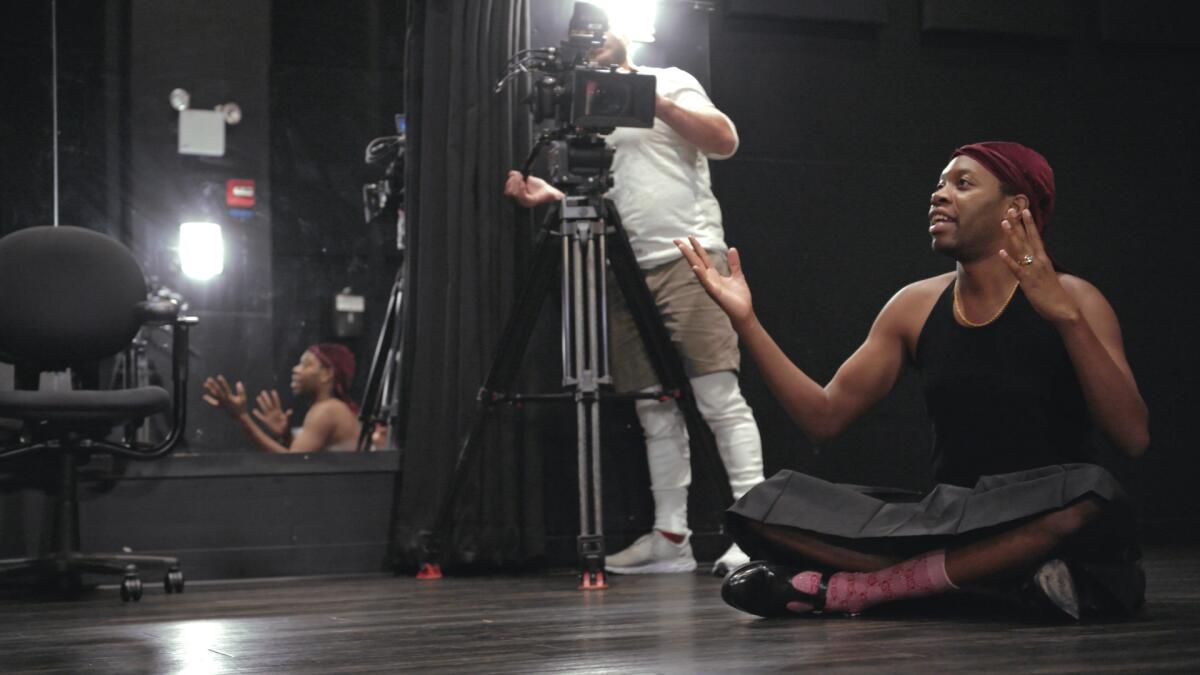
“The initial idea is that I wanted to go back to Yale with the original Yale cast and re-create our original Yale workshop,” he says. “But now my friends from school are signed actors with real jobs.”
While the Yale cast members are reunited in the documentary, it is not in the way Harris originally envisioned. Still, the playwright-turned-first-time-director wasn’t afraid to dive into unknown territory. “It was a weird little experiment,” he says, “because everything I do is a weird little experiment. I don’t ever endeavor to work in a mode that’s not like a playground.”
Harris already had a two-year exclusive deal with HBO, so his documentary seemed a natural fit for the cable network. Moukarbel, the film’s producer, had also worked with HBO and shared his friend’s passion for experimental work.
“The idea was: How do we do something that is experimental and also captures the challenging spirit of the play?” Moukarbel says. “For the viewer who didn’t see the play, not only do they get a little window into the actual book of the play, they get to hear the lines read and performed.”
Wins for ‘Stereophonic,’ ‘The Outsiders’ and others prove that nonprofit and regional theaters can succeed by prioritizing ambitious work and giving it time to develop.
As “Slave Play” was ending its limited run in January 2020, Harris was offered a chance to move the production to a larger theater. At that time, he says, he considered filming that milestone. “Black plays are rarely on Broadway,” he says. “Now the little-show-that-could is going back into a bigger theater and running even longer. What if we made a doc about moving the play?”
Then COVID-19 happened. Broadway shut down. The move was postponed. But Harris remained committed to the project.
“What I decided to do was use it as a playground to make the kind of documentary I would want to see if I was a theater student,” he says. “Like if ‘Slave Play’ was a play I had read in class, what would be a great companion for that play.”
Even if you’ve never heard of Jeremy O. Harris, you may have seen him or his work.
The 6-foot, 5-inch former Gucci model is also an actor (“Emily in Paris,” “Gossip Girl”), screenwriter (“Zola”) and producer (“Euphoria,” “Irma Vep”). In conversations, he is charming, playful and witty, with an easy laugh that belies his thoughtful penchant for provocation. Think of him as that inquisitive, well-read dinner party guest who ensures that your evening is memorable.
When “Slave Play” opened at the Golden Theatre, Harris became the youngest Black male playwright ever to have a play on Broadway, a distinction since surpassed by “Ain’t No Mo’” playwright Jordan E. Cooper. “That’s the fun thing about having superlatives,” Harris says, graciously. “You have them so that someone else can take them.”
His self-confidence is evident in the film, but so is his honesty. During a brief, yet poignant moment, Harris’ full vulnerability is on display as he reacts to “Slave Play” receiving a then-record 12 Tony Award nominations but leaving empty-handed.
Harris slyly acknowledges the divisiveness of his work at the top of the film with video taken at a 2019 post-show talk-back. In it, an angry white woman in the audience screams, “I don’t want to hear that white people are the f— plague … and a whole bunch of stuff about how white people don’t get how racist they are.”
From the stage, Harris responds, “This play is about eight specific people, and if you don’t see yourself up here, that’s great. … These are eight specific people that are in a play, which is a metaphor for our country. And a metaphor doesn’t have to represent every single person in it.”
A conversation with Michael R. Jackson, whose Tony-winning musical “A Strange Loop” is having its Los Angeles premiere at the Ahmanson Theatre.
That was hardly the first time the play had triggered an angry response. During the off-Broadway run, an online campaign called for the production to be shut down based on its “graphic imagery mixed with laughter from a predominantly white audience.” There were even threats of violence, forcing the theater to amp up security.
“Slave Play” fast became the talk of the city. It continued to make headlines when Rihanna, whose song “Work” is featured in the play, attended a preview and angered some Broadway purists by texting during the show. It turned out that she was texting the playwright, who fiercely defended her.
“One thing I said then that I still stand by is that theater has to contend with the fact that phones are a fact, and policing people around the use of their phones in the theater is an impossibility,” Harris says. “We have integrated these objects into our life as though they are new appendages, and to not recognize how much they rewired the ways in which we interact with space, the way we interact with art, is another barrier we have to break down in order to build new audiences.”
Harris remains committed to changing theater norms to attract diverse and younger audiences. To that end, he and his producers set aside 10,000 $39 tickets during the Broadway run of “Slave Play.”
“I didn’t see my first Broadway show until I was well into my 20s, because I could not afford it,” he says. “I’m trying to break down as many barriers of entry as possible to the young kid who wants to engage with theater on a bigger level, and to also make theater something sexy and cool and different.”
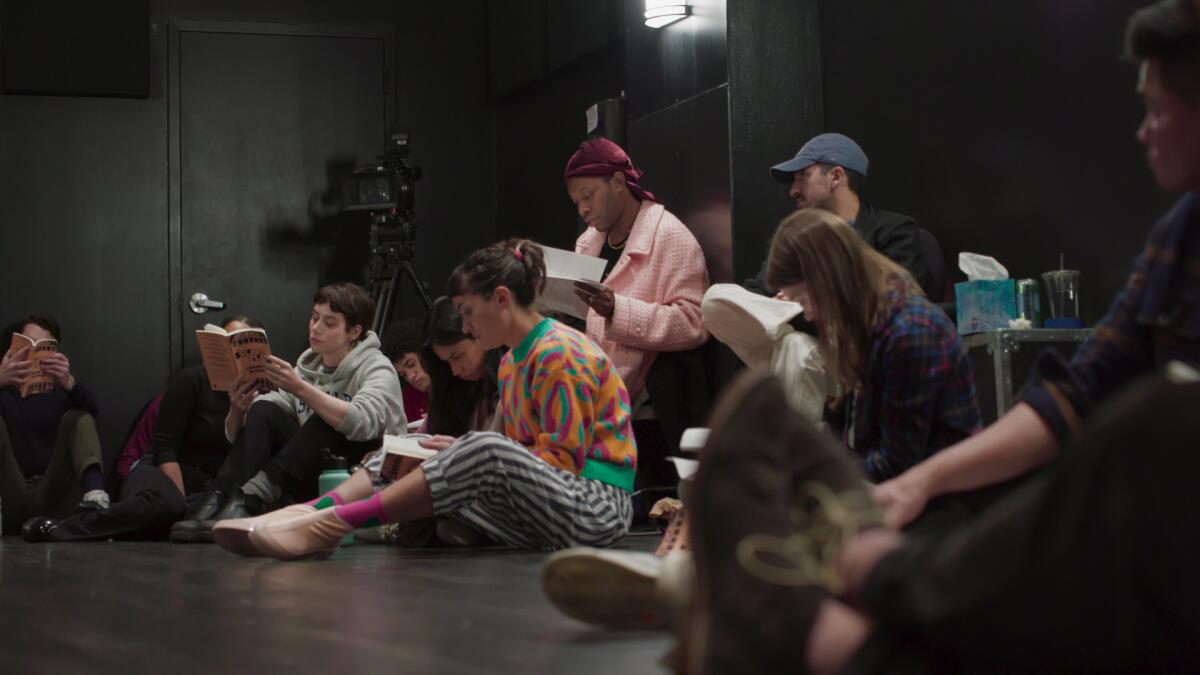
One beneficiary of the discounted tickets was actor Amani Owusu, 28, who would later participate in the workshop, playing Kaneisha, a sexually frustrated Black woman who finds release in portraying a submissive slave to her white partner’s whip-carrying “Massa Jim” in the play’s jaw-dropping first act.
“Everyone was talking about ‘Slave Play,’ but no one would give any sort of synopsis — everyone was just, ‘Go see it,’” Owusu recalls. “We were so shocked by the first half. We were like, ‘Should we stay? Should we go?’”
Things that didn’t make sense when she saw the play came into focus during the workshop after hearing Harris’ motivations behind the writing. “It felt like two separate, intense experiences,” she says. “Seeing the play and being like, ‘Wow, this is the craziest thing I’ve ever seen,’ then revisiting it and things really clicking.”
LaTonya Grant, 45, who also played Kaneisha in the workshop, says she avoided “Slave Play” on Broadway. “Hearing about slavery and race relations and all the pain that comes up around that topic, I had zero interest in seeing it,” she says. And when she was tapped for the workshop, she initially didn’t want any part of it. “But after I read the play, I said, ‘Oh, shoot, this is not what I thought at all. Count me in,’” she says. “I had to become comfortable with sitting in the discomfort.”
To this day, Harris remains surprised at the success of “Slave Play” but also encouraged by the impact it has had on theater.
“I fully did not think there was anything bigger for this play outside of sort of niche notability,” he says. “In the wake of ‘Slave Play’ doing so well, there was a big push and a sort of resurgence of doing work by queer people, work by people of color, women. People were starting to see that there was a possibility of the celebration of diverse works on commercial stages.”
Opera disrupter Yuval Sharon is back in L.A. with ‘The Comet / Poppea.’ The new piece — an exploration of double consciousness in disparate worlds set on a rotating stage — is Sharon’s latest fantastical take on the genre.
Starting in 2025, Harris will serve as the inaugural creative director of the Williamstown Theatre Festival’s Creative Collective, and he is juggling other projects, including a new production company. In the meantime, Harris returns to London this week to work on “Slave Play,” starring Kit Harrington (“Game of Thrones”) and Olivia Washington, daughter of Denzel and Pauletta Washington. Performances, which begin June 29, will include two “Black Out” nights similar to the Broadway performances for Black-identifying audiences.
“To have an all-Black audience presented with the possibility that maybe we could have a space where a Black play could come to Broadway and be as full with Black people as a Tyler Perry play was phenomenal,” he says. “We all have to make our voices heard. That’s one reason why I started producing — I complain about it, could fight it, or I could become a change maker and start doing the work to make the things I want to see happen.”
More to Read
The biggest entertainment stories
Get our big stories about Hollywood, film, television, music, arts, culture and more right in your inbox as soon as they publish.
You may occasionally receive promotional content from the Los Angeles Times.

